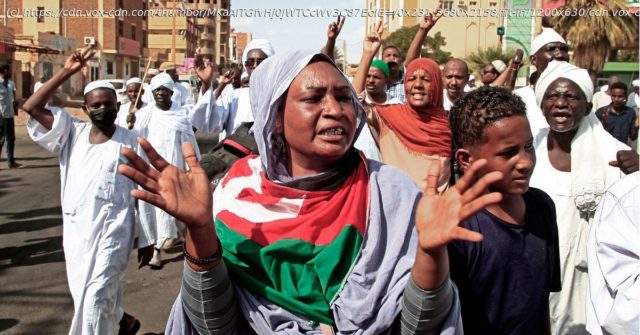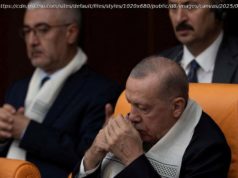A takeover by military leaders is threatening the country’s democratic transition. But protests are erupting in response.
Sudan’s move toward democracy is in peril, after the military seized control of the country’s transitional government in a coup. The country’s democratic project began just two years ago, after Sudan’s longtime dictator Omar al-Bashir was ousted amid mass protests in 2019. Civil society and protest leaders and the military ultimately reached a power-sharing arrangement that put both in charge of the country with the commitment of transitioning to full civilian rule, which would lead to a new constitution and elections in 2023. Monday’s coup has upended that entire endeavor, fracturing what was already a tenuous arrangement between the military and civilian factions and jeopardizing any gains made. Lt. Gen. Abdel Fattah al-Burhan, Sudan’s top general, orchestrated the power grab, detaining the civilian prime minister Abdalla Hamdok and other civilian leaders, and firing ambassadors who resisted the takeover. But the coup also reignited resistance, as protesters returned to the streets in cities and towns across Sudan to denounce the military takeover. The Sudanese military shut down the internet, making it difficult to fully understand the scope of the resistance — and the security forces’ response to it — especially outside major cities like Khartoum. At least 170 people have been injured, and at least seven people killed in Monday’s protests, according to data compiled by the UN Office for the Coordination of Humanitarian Affairs (OCHA). Some pro-democracy leaders have reportedly been detained. All of this makes for a very volatile, and unpredictable, situation. Despite international and regional pressure on the Sudanese military to restore the transitional government, experts said it is difficult to see a way forward under the same framework. “The trust has been broken,” said Michael Woldemariam, director of the African Studies Center at Boston University. “The military has really bared its teeth here — and the more that we see violence deployed by the security forces, the more difficult it’s going to be to go back to this old arrangement.” That offers a bleak outlook for Sudan’s democratic experiment. But Sudan’s civil society, which helped bring about the revolution that ousted al-Bashir in 2019, remains well-organized and strong. Civil society groups are calling for large-scale protests on October 30 in the latest act of defiance against the coup. From the beginning, protesters did not trust the military to usher in democracy, and they’ve continued to distrust the armed forces and push for civilian contro l, even before the takeover this week. The coup proved the pro-democracy camp right, which is strengthening their demand for a civilian-led government. How they can achieve that is uncertain, but the ongoing protests are a sign the military cannot fully undo the democratic project Sudan started. “What’s being spread around now is that ‘we’ve done this before, and we can do it again,” said Sarah O. Nugdalla, a Sudanese researcher currently based in Washington, DC. “That is the spirit right now. It’s again ‘we have nothing to lose.’” Sudan’s transition was already pretty shaky before the coup There were plenty of warnings that Sudan’s democratic transition was in danger. The transition process was always a bit unstable. “This entire time, it’s been a very uneasy marriage,” said Akshaya Kumar, director of crisis advocacy for Human Rights Watch. The core of this uneasy marriage was a pact between the Transitional Military Council, led by al-Burhan, and the Forces of Freedom and Change, the coalition of civilian opposition groups, led by now-deposed Prime Minister Hamdok. The ultimate goal of the transitional government was to ease into a fully (and eventually democratically elected) civilian-led government, with the military exiting from ruling powers. A 2020 peace deal also brought rebel groups into the transition — a vital part of the process, but one that added new factions with competing interests. All of these tensions had been rising in recent months, as pressure grew on the military to keep to its commitment to hand over its powers to the civilian-led government.






